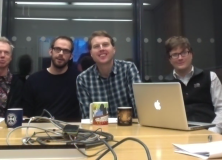
The Ethics of Extended Cognition: Is Having Your Computer Compromised a Personal Assault?
New project output by Adam Carter and Orestis Palermos in the Journal of the American Philosophical Association: The Ethics of Extended Cognition: Is Having Your Computer Compromised a Personal Assault? Abstract: Philosophy of mind and cognitive science (e.g., Clark and Chalmers 1998; Clark 2010; Palermos 2014) have recently become increasingly receptive to the hypothesis of extended cognition, according to which external artifacts such
read more

Augmented Skepticism: The Epistemological Design of Augmented Reality
New project output by Orestis Palermos to appear in Augmented Reality. Reflections on its Contribution to Knowledge Formation, José María Ariso (ed), 2017, De Gruyter (series: Berlin Studies in Knowledge Research), Berlin & New York: ‘Augmented Skepticism: The Epistemological Design of Augmented Reality’ Abstract. In order to solve the problem of the traditional account of
read more

Semantic Inferentialism as (a Form of) Active Externalism
New project output by J. Adam Carter, James Collin and Orestis Palermos in Phenomenology and the Cognitive Sciences: ‘Semantic Inferentialism as (a Form of) Active Externalism’ Abstract. Within contemporary philosophy of mind, it is taken for granted that externalist accounts of meaning and mental content are, in principle, orthogonal to the matter of whether cognition itself is
read more

Extended Knowledge Project Impact Event
On January 28, 2016, we are holding an impact event for the recently completed Extended Knowledge Project. The aim of the event is to demonstrate how conceiving of knowledge as extended and socially extended can provide the means for analysing and further developing a number of modern epistemic trends (such as our increased reliance on information
read more

2nd Public Lecture: The Knowledge Ecology
On 30 October, 2015, 17:00 – 18:30, Prof Michael Wheeler (University of Stirling) will give the project’s second public lecture on ‘The Knowledge Ecology: The Past, Present and Future of Knowing with People and Things.’ Abstract. As a cognitive phenomenon, knowledge is often thought of as residing within the heads of individual human beings. By reflecting on
read more

Group Knowledge and Epistemic Defeat
New project output by Adam Carter in Ergo: ‘Group Knowledge and Epistemic Defeat’. Abstract. If individual knowledge and justification can be vanquished by epistemic defeaters, then the same should go for group knowledge. Lackey (2014) has recently argued that one especially strong conception of group knowledge defended by Bird (2010) is incapable of explaining how it
read more

Socially Extended Knowledge – 2nd International Conference
Registration for the 2nd International Conference on the topic of Socially Extended Knowledge is now open. Socially Extended Knowledge is the second of two international conferences on the topic of ‘Extended Knowledge.‘ The aim of the first ‘Extended Knowledge Conference‘ was to bring together leading scholars from around the world in order to critically examine
read more

The Distribution of Epistemic Agency
New project output by Orestis Palermos and Duncan Pritchard in Social Epistemology and Epistemic Agency: De-Centralizing Epistemic Agency, (ed.) P. Reider, Rowman & Littlefield: The Distribution of Epistemic Agency. Abstract. In this volume, Goldberg (Chapter 1) defines his socio-epistemological research programme by noting that “the pursuit of social epistemology is the attempt to come to terms with
read more

To Google, or Not to Google, During Exams, by Orestis Palermos and Duncan Pritchard
Mark Dawe, Chief Executive of the OCR exam board, has recently claimed that students should be allowed to use Google during GCSE and A-level exams. Predictably, this intervention met with opposition from educational traditionalists, such as Chris McGovern, Chairman of the Campaign for Real Education, who responded that this is “nonsense […] a dumbing down
read more

Extended Knowledge-How
New project output by J. Adam Carter & Bolesław Czarnecki in Erkenntnis: ‘Extended Knowledge-How’ Abstract. According to reductive intellectualists about knowledge-how (e.g. Stanley and Williamson 2001; Stanley 2011; Brogaard 2008; 2009) knowledgehow is a kind of knowledge-that. To the extent that this is right, then insofar as we might conceive of ways knowledge could be extended with reference
read more

Spreading the Credit: Virtue Reliabilism and Weak Epistemic Anti-Individualism
New project output by Orestis Palermos in Erkenntnis: Spreading the Credit: Virtue Reliabilism and Weak Epistemic Anti-Individualism. Abstract. Mainstream epistemologists have recently made a few isolated attempts to demonstrate the particular ways, in which specific types of knowledge are partly social. Two promising cases in point are Lackey’s dualism in the epistemology of testimony (2008) and Goldberg’s
read more

Extended Knowledge – 1st International Conference
Registration for the 1st international Conference on the topic of Extended Knowledge is now open. The aim of this 1st International Conference on the topic of ‘Extended Knowledge’ is to bring together leading scholars from around the world in order to critically examine the ramifications of the extended cognition programme (and related views) to contemporary
read more

‘Active Externalism, Virtue Reliabilism and Scientific Knowledge’, in Synthese, by Orestis Palermos
New project output by Orestis Palermos: “Active Externalism, Virtue Reliabilism and Scientific Knowledge”, in Synthese. Abstract: Combining active externalism in the form of the extended and distributed cognition hypotheses with virtue reliabilism can provide the long sought after link between mainstream epistemology and philosophy of science. Specifically, by reading virtue reliabilism along the lines suggested by the
read more

Reading group with Mark Alfano and Gus Skorburg on Skype
On December 9, 2014, the ‘Extended Knowledge’ reading group met to discuss Mark Alfano and Gus Skorburg’s work in progress, entitled “The Embedded and Extended Character Hypotheses.” Apart from Mark and Gus’ excellent paper, which sparked a lot of interesting conversation, this was an exceptional meeting as it was also the first time we had both authors present
read more

Recent Comments